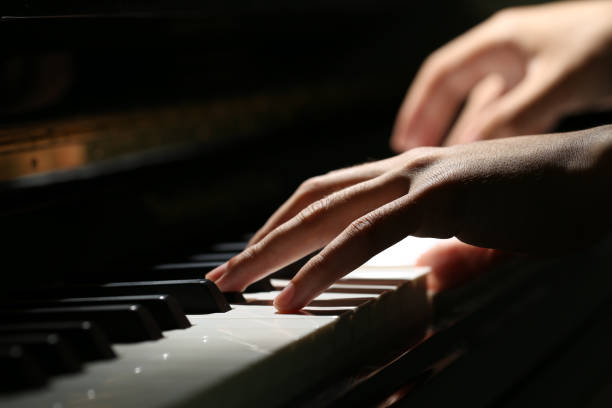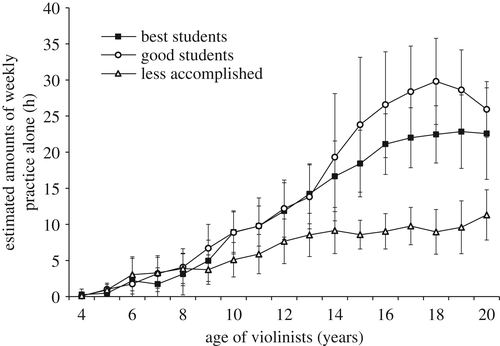Piano Practice and the 10,000-hour Rule
A recent study seems to have dealt a blow to the often cited idea that 10,000 hours of practice will make an expert of anyone. “The idea has become really entrenched in our culture, but it’s an oversimplification,” says Brooke Macnamara, a psychologist at Case Western Reserve University in Cleveland, Ohio.

The origins of the 10,000-hour theory
The 10,000-hour theory was popularised in Malcolm Gladwell’s book Outliers (2008), in which he states that “ten thousand hours is the magic number of greatness”. A lot of people – not least piano teachers – have really seized upon this, to the point of ignoring Gladwell’s other ideas. The book proposes a formula for success that could be summed up like this:
Talent + Various cultural, social, financial, and circumstantial advantages + 10000 hours of practice = Unusual success.
This is demonstrated by a set of examples like The Beatles, Bill Gates etc. In other words, Gladwell is trying to explain how certain extraordinary circumstances create extremely successful people, rather than revealing the best way to achieve expertise.
What does science say?
Gladwell in his turn had picked up the 10,000-hour rule from a 1993 study, which found that violin students pointed out by their professor as having potential for careers as international soloists, had clocked up on average 10,000 hours of practice by the age of 20. What the study also found was that “individual differences, even among elite performers, are closely related to assessed amounts of deliberate practice”.
The recent study by Brooke Macnamara and Megha Maitra could not replicate this latter finding. Using the same categories as in the previous study, they found that “good” violinists (these were students in a highly ranked music conservatory, but were not deemed potential future international soloists by their professors) had accumulated even more practice time than the “best” ones. (Both the “best” and the “good” had an average accumulated practice time of more than 10 000 hours). The “less accomplished” violinists – who were also music students, but in a department of music education – had practiced less, but certainly several thousand hours.
Amounts of weekly practice for students in the new Macnamara/Maitra study:

Should I keep aiming for the 10,000 mark?
Well, nothing in the new study debunks the claim that it takes a long time and a tremendous amount of work to become an accomplished musician. It still seems like aspiring professional musicians (and music teachers) practice a lot. Of course, the 10,000-hour rule was never intended as a guarantee of success. You may or may not become a professional musician, but you can reach a very high level of skill if you are dedicated enough to keep going for thousands of hours.
The concept can also be useful to counterbalance our tendency to focus on talent as something almost magical, an innate ability that some people just have. Musical talent could just mean a love of music that motivates you to play your instrument for hours every day, in order to solve the problems you need to solve to become accomplished.
Further reading:
Comments
“The concept can also be useful to counterbalance our tendency to focus on talent as something almost magical, an innate ability that some people just have. Musical talent could just mean a love of music that motivates you to play your instrument for hours every day, in order to solve the problems you need to solve to become accomplished.”
Thank you so much for writing this! Over my many years of performing and being a musician, I have heard a great deal about my (sometimes God-given, sometimes not) “talent”.
My personal opinion is that there is no such thing as a “talent” for any particular skill. I certainly didn’t have any such talent when I first sat down to play the piano. It was a painstaking process, and for the skills that I possess today I credit those many, many hours spent playing and solving those problems, as you suggested.
There are surely two different conversations here. No one whether they are brilliant or whether they are merely talented can become accomplished at anything (music, football etc.) without huge amounts of practice – it is just a requirement for excellence. But you cannot possibly suggest as per above that is you apply yourself equally to your task/ craft you will end up with the same degree of talent/ genius. That is inherent nonsense and witnessed by pure logic. If you put 10 people together from the age of 6 until 18 with the same brilliant teacher and they all practiced the same number of hours then there is no way they will all end up being Marc Andre Hamelin, Lionel Messi or Roger Federer. Not a chance. Everybody starts on the same footing but innate genius will then allow a select few to achieve superhuman feats while everyone else will be from very good down to very ordinary. I practiced bass guitar for years and Ther is no chance I could ever be on the level of John Entwhistle (The Who) or Jaco Pastorius (jazz fusion genius) – I simply didn’t have the fa ility to do so. Not everyone’s synapses spark in the same way for the same skill – hence the reason Federer is a tennis god and the world number 30 is not.
I would agree with Guy, there is no way on earth any kind or amount of practice will create a master from a student with no innate talent for the task at hand.There is no question whatsoever that fundamental cognitive ability has a huge effect on ones ability to play a musical instrument, as it inherently involves absorbing huge amounts of information very rapidly, and the ability to draw knowledge from memory extremely rapidly with very little or zero tolerance for errors.This clearly cannot be accomplished by an individual with ordinary cognitive ability.
I realized that after around 9000 hours of extremely dedicated, deliberate practice, that I was still a VERY ordinary pianist, not even remotely close in skill level to “talented” players.And when I really examined specifically what was holding me back, and I mean really broke down the chain of events in the learning process and put them under a magnifying glass, it became apparent that my cognitive abilities on a very fundamental level were simply not up to the task. And after researching the topic, realized that those abilities could not be improved much, because they are largely inherited. I consistently found that advice relating to more effective or efficient practice tecniques produced only small gains, nowhere near what would be required to actually become good at the task. I estimate that an extremely effective practice regimen is still only moderately better than any old hacking away at the task, perhaps 30% more efficient.Yet gifted players learn 500% faster, needing only a few minutes to master what takes months of agonizing practice for the un gifted. My own personal experience leaves me with no doubt about the innate nature of talent.It cannot be taught, and it cannot be learned. You either have it or you dont, and if you don’t, there is absolutely nothing on earth that will make you a master.
It has been studied and the results do appear to show that practicing does not account for most of the variation in skill level. It has become very clear that genetic factors are crucial in determining potential at a variety of tasks.It is a very unpopular truth that each individual has a different limitations on his/her abilities, based on the qualities inherited at birth. A person cannot overcome these limitations through efforts or practice.It has been estimated that practice accounts for less than 1/5th of an athletes performance, with the remaining 4/5th determined by a variety of factors, mostly out of the individuals control i.e genetics and upbringing.
I think a genuine love for music, that can fuel going through the hours needed to become proficient with focus – where it does not feel like work to practise – is a hugely underrated component. Without that, you can still force yourself through it, but will it be with the same focus and curiousity? And more importantly, have you actually gained anything if you become proficient at something you do not love doing?